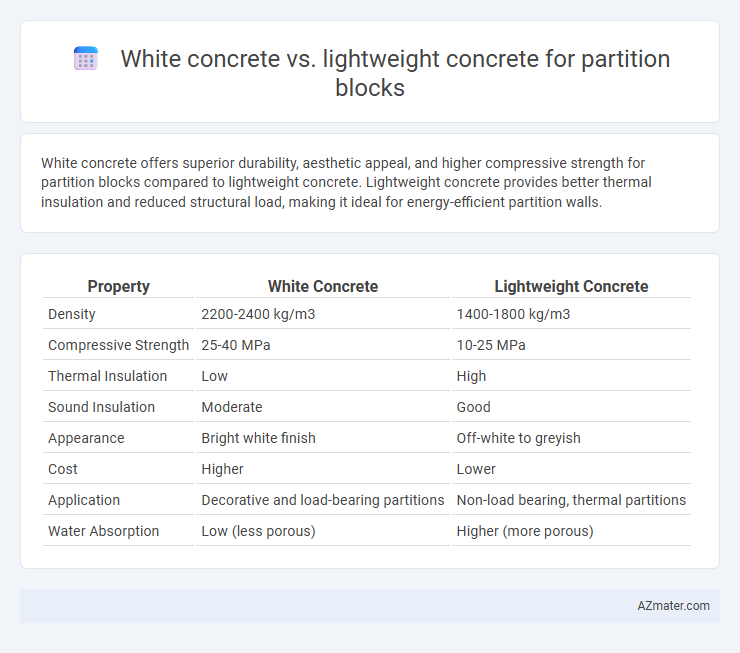White concrete offers superior durability, aesthetic appeal, and higher compressive strength for partition blocks compared to lightweight concrete. Lightweight concrete provides better thermal insulation and reduced structural load, making it ideal for energy-efficient partition walls.
Table of Comparison
| Property | White Concrete | Lightweight Concrete |
|---|---|---|
| Density | 2200-2400 kg/m3 | 1400-1800 kg/m3 |
| Compressive Strength | 25-40 MPa | 10-25 MPa |
| Thermal Insulation | Low | High |
| Sound Insulation | Moderate | Good |
| Appearance | Bright white finish | Off-white to greyish |
| Cost | Higher | Lower |
| Application | Decorative and load-bearing partitions | Non-load bearing, thermal partitions |
| Water Absorption | Low (less porous) | Higher (more porous) |
Introduction to Partition Blocks: White Concrete vs Lightweight Concrete
Partition blocks play a crucial role in non-load-bearing wall construction, with white concrete and lightweight concrete as popular material choices. White concrete partition blocks offer high aesthetic appeal and superior surface finish due to their color uniformity and density. Lightweight concrete blocks prioritize thermal insulation and ease of handling, with enhanced fire resistance and reduced structural load for efficient partition wall solutions.
Composition and Material Properties
White concrete for partition blocks primarily consists of white cement, fine aggregates like white sand, and often a lower water-cement ratio, resulting in a smooth, highly durable finish with enhanced aesthetic appeal. Lightweight concrete incorporates lightweight aggregates such as expanded clay, shale, or foam beads, reducing density while maintaining acceptable compressive strength and thermal insulation properties. The choice between white and lightweight concrete impacts structural load, thermal performance, and surface texture, with white concrete offering higher density and strength and lightweight concrete providing improved energy efficiency and ease of handling.
Weight Comparison: Density and Structural Impact
White concrete typically has a higher density, around 2200 to 2400 kg/m3, compared to lightweight concrete used in partition blocks, which ranges from 1200 to 1800 kg/m3. The lower density of lightweight concrete reduces the overall weight of partition walls, easing structural loads and enabling faster installation. This weight difference significantly impacts building design, with lightweight concrete offering improved seismic performance and reduced foundation requirements.
Thermal Insulation and Energy Efficiency
White concrete provides moderate thermal insulation and energy efficiency in partition blocks due to its denser composition, which offers better structural strength but retains more heat. Lightweight concrete, made from materials like expanded clay or pumice, exhibits superior thermal insulation properties by reducing heat transfer, leading to improved energy efficiency in buildings. Choosing lightweight concrete for partition blocks helps maintain cooler indoor temperatures and lowers HVAC energy consumption, contributing to sustainable construction practices.
Acoustic Performance in Partition Applications
White concrete partition blocks offer superior acoustic insulation due to their dense composition, effectively reducing sound transmission between rooms. Lightweight concrete blocks, while easier to handle and install, tend to have higher porosity, resulting in lower sound attenuation capabilities. For partition applications requiring enhanced noise control, white concrete provides better soundproofing performance, making it ideal for residential or commercial buildings where acoustic isolation is critical.
Installation Methods and Ease of Handling
White concrete partition blocks offer straightforward installation due to their uniform density and smooth surface, allowing precise alignment and reduced finishing time. Lightweight concrete blocks are easier to handle and transport because of their lower weight, enabling faster placement and reducing labor fatigue on-site. Both materials require standard masonry tools, but lightweight blocks typically speed up the installation process in large-scale projects by minimizing manual effort.
Durability and Long-Term Performance
White concrete partition blocks exhibit superior durability due to their dense microstructure and high compressive strength, which enhances resistance to environmental wear and chemical attacks. Lightweight concrete partition blocks offer improved thermal insulation and reduced structural load but may have lower long-term strength and increased susceptibility to moisture penetration. For long-term performance, white concrete blocks are preferred in high-stress or moisture-prone environments, while lightweight blocks suit applications prioritizing energy efficiency and ease of installation.
Cost Analysis and Economic Considerations
White concrete Partition blocks generally exhibit higher material costs due to the use of white cement and specialized aggregates, impacting the overall budget in construction projects. Lightweight concrete offers significant cost savings in transport and handling thanks to its reduced density, and its thermal insulation properties can decrease long-term energy expenses. Evaluating cost per cubic meter alongside lifecycle economic benefits is crucial for selecting the optimal partition block material in budget-sensitive developments.
Sustainability and Environmental Impact
White concrete partition blocks offer high durability and reflectivity, reducing cooling loads and energy consumption in buildings, which supports sustainability goals. Lightweight concrete partition blocks, often composed of recycled materials and industrial by-products, provide enhanced thermal insulation, leading to lower operational energy use and a smaller carbon footprint. Both materials contribute to environmentally friendly construction, but lightweight concrete emphasizes reduced resource consumption and improved waste management in production.
Best Applications and Recommendations
White concrete offers superior aesthetic appeal and durability for visible interior partition blocks, making it ideal for decorative walls and premium interiors. Lightweight concrete excels in thermal insulation and reduces overall structural load, suited for non-load bearing partitions and energy-efficient building designs. Use white concrete where appearance and strength are priorities, while lightweight concrete is recommended for cost-effective, thermally insulated partition solutions.

Infographic: White concrete vs Lightweight concrete for Partition block
 azmater.com
azmater.com